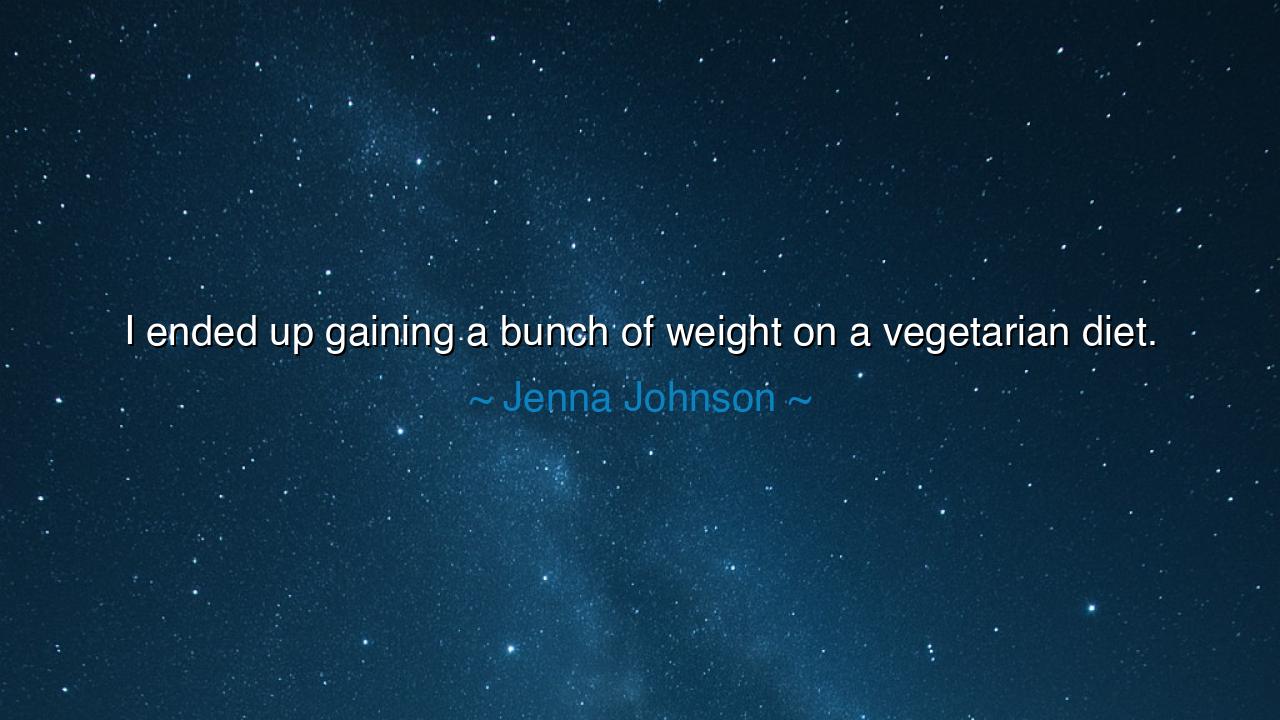
I ended up gaining a bunch of weight on a vegetarian diet.






The words of Jenna Johnson—“I ended up gaining a bunch of weight on a vegetarian diet”—though simple in their telling, contain a wisdom that reaches far beyond food or body. Beneath their light tone lies a timeless truth: that good intentions, when guided by misunderstanding, can lead to unexpected results. It is a reminder that even the noblest path, if walked without awareness, may stray from balance. Johnson’s reflection, born from personal experience, becomes a parable for all who seek improvement—whether in body, mind, or spirit.
In her words, we hear not frustration, but discovery. The vegetarian diet, often embraced as a symbol of health, compassion, and self-discipline, became for her a test of balance and knowledge. She sought nourishment and purity, yet found herself moving further from what she intended. Such is the paradox of human striving: the very thing we hope will liberate us can, without wisdom, bind us in another way. Ancient thinkers knew this truth well. The philosopher Confucius spoke often of moderation, warning that even virtue, when carried to excess or pursued blindly, can become its opposite. What nourishes one soul may burden another; what purifies one body may exhaust another.
The origin of this lesson lies not in modern diet or fashion, but in the eternal rhythm of life itself—the rhythm of balance. In all things, there exists a middle path, what the Greeks called the golden mean. To eat without reflection, even in the name of health, is like setting sail without compass or star. One may have the finest vessel, but if the winds of knowledge do not guide it, the sea will carry it where it will. Johnson’s experience thus becomes a living allegory: that wisdom is not found in labels—“vegetarian,” “vegan,” “disciplined”—but in understanding one’s own nature.
Consider the tale of Buddha, who once sought enlightenment through extreme self-denial. He starved his body, believing that holiness required emptiness. But near death, he realized that weakness of body leads to weakness of spirit. When a young girl offered him a bowl of rice milk, he accepted it, breaking his fast—and in that act, he discovered the Middle Way, the path between indulgence and deprivation. From that moment, he taught that balance, not extremity, leads to awakening. So too does Jenna Johnson’s reflection remind us that health is not found in rigid rule, but in mindful balance—nourishing both body and joy.
Her words also reveal the power of honesty—the courage to admit that a chosen path did not bring the expected peace. In a world where perfection is idolized, to speak truthfully of one’s missteps is a profound act of humility. It invites others to examine their own choices with compassion, not judgment. The ancients valued such candor. Socrates himself confessed ignorance as the beginning of wisdom. To say, “I was wrong,” is not defeat—it is the first step toward truth. Johnson’s confession, though framed in humor, holds that same spirit of learning through imperfection.
On a deeper level, her words remind us that the body is a teacher, not a servant. It speaks in hunger and fatigue, in strength and weakness. When it resists, it is not rebellion—it is guidance. To ignore its voice in pursuit of an ideal, even a noble one, is to lose harmony between spirit and flesh. The wise of every age have known this: that self-mastery is not achieved through punishment, but through understanding. Whether in diet, ambition, or morality, the principle is the same—listen, adapt, and seek the balance that sustains rather than depletes.
Let this be the lesson carried forward: seek wisdom, not extremes. Do not follow paths simply because others praise them; seek instead what brings you genuine vitality and peace. Remember that even good intentions can falter when divorced from mindfulness. Approach all things—food, work, love, and belief—with curiosity rather than rigidity. The purpose of any discipline is not to confine you, but to free you into greater harmony.
So let the words of Jenna Johnson stand as both caution and comfort: even when the road of self-improvement leads us astray, there is no shame in turning back to understanding. The body may falter, but the spirit can always learn. And in that learning, we find the greatest nourishment of all—balance, the quiet strength that feeds both the flesh and the soul.






AAdministratorAdministrator
Welcome, honored guests. Please leave a comment, we will respond soon